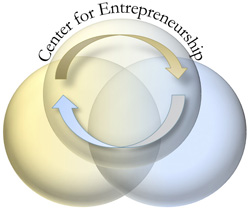Campus News
UCSC launches Center for Entrepreneurship
UCSC has launched a new Center for Entrepreneurship, which offers students across disciplines comprehensive, hands-on experience in bringing innovations to market.

“Teaching entrepreneurship is like teaching medicine,” said Dan Heller, the center’s executive director. “You can’t just teach it in a classroom. You have to apply theories in a real-world environment so students can observe and understand the realities of today’s marketplace.”
The center is working with various campus departments and programs–including computer science, economics, psychology, and digital arts and new media–to create courses that focus on entrepreneurship. These courses will give students the opportunity to work with experienced industry veterans to create pragmatic business models for simulated startup companies. In some cases, the business models may be based on intellectual property created by UCSC researchers or students.
The C4E is also working with faculty to identify promising ideas emerging from campus research labs and educate faculty about the steps involved in turning their innovations into marketable products.
“The UCSC faculty includes leading researchers in a broad range of technological fields, including information technology, energy and sustainability, and biomedicine,” said Chancellor George Blumenthal. “The Center for Entrepreneurship will help to increase the influence of these researchers in the worlds of business and industry.”
Campus research labs are a rich source of innovative ideas and leading-edge technology. In a recent analysis of top North American universities, UCSC ranked fourth (behind only Caltech, MIT, and Princeton) in citation impact, a measure of research influence based on the number of times published work is cited by academics. UCSC also ranks ninth in federal research dollars per faculty member when compared to members of the Association of American Universities without medical schools.
One of the C4E’s early efforts has been to expand the UCSC business plan competition, which was started in 2009 by students with support from community members, local government, industry representatives, and the university. This year, more than 100 students are participating in the C4E’s Business Design Competition. On May 20, eight teams will compete for the opportunity to receive a top award of $10,000. Among them are two plans for nonprofit corporations with an emphasis on green and social technologies, and two that are focused on clean energy.
The local community is enthusiastic about the new entrepreneurship program at UC Santa Cruz, seeing it as a catalyst that will help stimulate economic development in the region. “UCSC is the region’s largest economic engine, and capturing the talent, enthusiasm and creativity of its students and faculty is key to regional prosperity,” said Peter Koht, economic development coordinator for Santa Cruz. The city has supported the student business plan competition since its inception and partners with the campus on the Project for Innovation and Entrepreneurship, an internship program that places engineers and business majors into local startups.
The city also recently financed a study exploring the benefits of fostering more entrepreneurship among UCSC students and graduates. The study was conducted by an independent nonprofit technology incubator, which is raising venture capital to fund startup companies in Santa Cruz. The incubator, now known as the “Startup Lab,” was established by Heller in 2010 as a nonprofit corporation (then called C3E) that is separate from the campus and the UCSC Center for Entrepreneurship. Heller said his plan for the Startup Lab is to create new companies that could license from the university promising technology developed in campus labs and identified by C4E as having commercial potential.
The C4E is operating out of UCSC’s Jack Baskin School of Engineering, but is designed to serve students from all disciplines. According to engineering dean Art Ramirez, the C4E’s academic activities are designed to give students practical experience in tackling the challenges of entrepreneurship.
“The C4E curriculum mirrors the realities of how multi-faceted challenges are solved,” Ramirez said. “Students both learn and experience fundamental principles that are applicable to any career, whether you’re starting a business, shaping policy in government, or working for a non-profit corporation.”